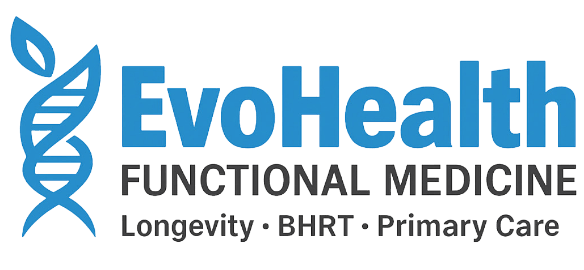Can Low Testosterone Cause Fatigue?
If you’re a man, you’re probably well aware of testosterone supplements and how they can “help” you restore strength, vigor, and potency to your life. It’s hard not to be when we’re constantly being bombarded by online, TV, and radio advertisements for various testosterone supplements. The problem is, none of these supplements are going to help if you don’t address the underlying factors causing your low T in the first place.
Functional medicine can help you uncover the root causes of your testosterone imbalances. While testosterone often takes center stage as the primary driver of libido and masculinity, we need to look at other symptoms, too. The impact of low testosterone levels extends far beyond mere virility into the realms of physical and mental health.
If you’re always exhausted and feel more depressed than usual, then low testosterone might be to blame. That’s why EvoHealth has put together this article on how testosterone can cause fatigue.
Fatigue and Tiredness Are Not the Same
Fatigue, characterized by persistent tiredness and lack of energy, is a pervasive issue that affects males across all demographics. From grappling with daily responsibilities to pursuing personal goals, fatigue can act as a formidable barrier, hindering productivity and diminishing quality of life. While factors like stress, sleep disturbances, and poor diet are often cited as reasons for chronic fatigue, the role of hormonal imbalances, particularly low testosterone, deserves attention.
How Low Testosterone Causes Fatigue
Testosterone plays a pivotal role in regulating various bodily functions, including muscle mass, bone density, and red blood cell production.
However, its influence on energy levels is equally significant. Testosterone acts on several tissues and organs throughout the body, promoting metabolic processes that contribute to vitality and vigor. When testosterone levels dip below optimal thresholds, as seen in conditions like hypogonadism, the body may experience a decline in energy production and utilization, leading to fatigue and lethargy.
Testosterone also interacts with neurotransmitters and receptors in the brain, modulating mood and cognitive function. Thus, disruptions in testosterone levels can precipitate mental fatigue, characterized by difficulties in concentration, memory lapses, and a pervasive sense of mental fog. This complicated interplay between hormones and brain function underscores the multifaceted nature of fatigue in individuals with low testosterone levels.
The Impact on Mental Health: Beyond Physical Fatigue
While the physical manifestations of fatigue are readily apparent, its toll on mental health is equally profound. Low testosterone levels have been associated with an increased risk of depression, anxiety, and irritability, further exacerbating feelings of exhaustion and weariness. The intricate web of hormonal signaling within the brain underscores the intricate relationship between testosterone and mental well-being.
Moreover, fatigue can act as a vicious cycle, exacerbating existing psychological distress and diminishing resilience in the face of stressors. As individuals grapple with persistent tiredness and depleted energy reserves, the capacity to cope with life’s challenges may dwindle, perpetuating a downward spiral of fatigue and compromised mental health.
Other Symptoms of Low Testosterone
While fatigue serves as a hallmark symptom of low testosterone levels, its manifestations extend beyond mere exhaustion. Individuals with hypogonadism or other conditions leading to testosterone deficiency may experience a myriad of symptoms, including:
- Loss of muscle mass and strength: Testosterone is essential for muscle development and maintenance. Consequently, low testosterone levels may result in decreased muscle mass, strength, and exercise tolerance.
- Osteoporosis or reduced bone density: Testosterone plays a crucial role in maintaining bone density and strength. Low testosterone levels can contribute to bone loss, increasing the risk of osteoporosis and fractures, particularly in older men.
- Sleep disturbances: Testosterone influences sleep patterns and quality. Low testosterone levels have been linked to insomnia, disrupted sleep, and sleep apnea, further contributing to fatigue and daytime drowsiness.
- Decreased motivation and initiative: Testosterone plays a role in regulating motivation, drive, and assertiveness. Individuals with low testosterone levels may experience a loss of motivation, reduced initiative, and decreased willingness to engage in activities they once enjoyed.
- Increased body fat: Testosterone helps regulate fat metabolism, and its deficiency can lead to an accumulation of body fat, particularly around the abdomen.
Here’s What Usually Causes Low Testosterone
While aging is a natural factor contributing to declining testosterone levels, various underlying conditions and lifestyle factors can hasten this process. Chronic medical conditions such as obesity, diabetes, and hypothyroidism can disrupt hormonal balance, leading to diminished testosterone production. Additionally, factors like excessive alcohol consumption, sedentary lifestyle, and chronic stress can exacerbate testosterone decline, predisposing individuals to fatigue and its associated symptoms.
Certain populations are at increased risk of developing low testosterone levels, including older males, men with obesity or metabolic disorders, and those with a history of testicular injury or medical conditions affecting the hypothalamus or pituitary gland. Moreover, certain medications, such as corticosteroids and opioids, can interfere with testosterone production, further complicating the hormonal landscape.
Check Out EvoHealth’s Functional Medicine Program
Navigating the complex terrain of hormonal imbalances and fatigue necessitates a holistic approach that addresses underlying causes and promotes optimal health and vitality. EvoHealth’s functional medicine program offers a comprehensive framework that emphasizes personalized care, lifestyle modifications, and targeted interventions to optimize hormonal balance and alleviate fatigue.
Through thorough evaluation and cutting-edge diagnostic testing, EvoHealth’s team of experts tailors treatment plans to address the unique needs and goals of each individual. From optimizing nutrition and exercise regimens to exploring hormone replacement therapy options, EvoHealth’s functional medicine program empowers individuals to reclaim their energy, vitality, and overall well-being.
